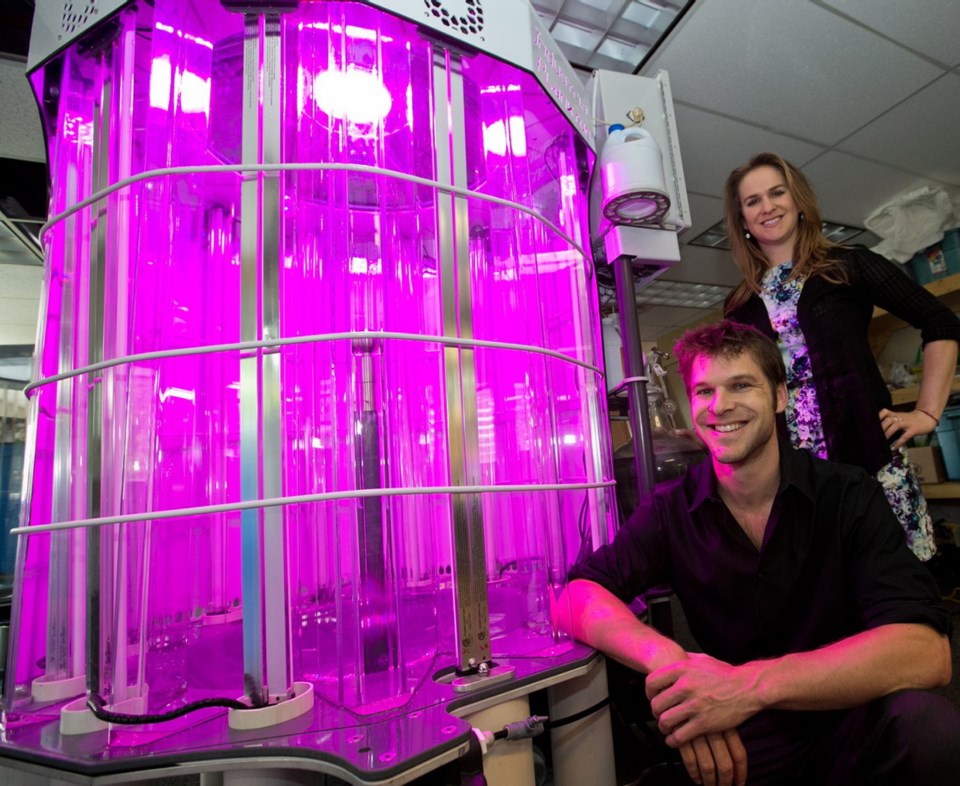They have a new name and a new focus and, as of this week, Industrial Plankton has a new lease on life as the three-year-old Victoria company has made its first major sale in a bid to make a name for itself in the aquaculture industry.
The firm, run by brother and sister Ashley and Robert Roulston, was previously known as Reef Safe Fish and in 2011 won the B.C. Innovation Council’s regional New Ventures competition for its closed-loop, waste recycling technology that recycles fish waste to produce food for penned fish.
That was then.
Now, with a name that more accurately reflects what it does, Industrial Plankton has adapted its technology to manufacture plankton to be used to feed shellfish. “Everything has been an evolution of the technology we started with,” said Robert.
The original concept was to establish technology to breed aquarium fish before the company switched to the recycling system and eventually evolved into the algae production business.
Robert said algae production was part of the fish breeding concept.
“We realized that was a real challenge and that there was probably a market in it,” he said. So they changed the design of their equipment and came up with a free-standing bioreactor that grows algae designed for the shellfish aquaculture industry.
The sealed chamber, when seeded with about 20 litres of algae, is capable of growing up to 1,000 litres of pure culture over the course of a week.
“It can also clean and sterilize itself and it has a sensor that monitors [algae growth] and can tell how many cells are in the water,” Robert said.
The machine also self-harvests and replaces the culture with new water and nutrients. And while it does all this, it also saves farmers in the shellfish farming industry time and money, said Ashley. “Forty per cent of their operating costs are growing algae and it has been problematic,” she said.
The partners expect that when the first bioreactor goes into use this year it could fuel strong demand for their product.
The first two models produced by Industrial Plankton will go to Nova Harvest in Bamfield and are expected to be in service within the next two weeks.
Nova Harvest president J.P. Hastery said the bioreactors will have a huge impact on his young company, a shellfish hatchery that produces geoduck clam seed for geoduck farmers. “It’s a high-efficiency machine for growing large quantities of clean algae and it will reduce my operating costs through automation [because] growing algae is one of the most expensive components of my business,” he said.
“This adds extra capacity at minimal cost.”
If the bioreactor does what it’s expected to do, Industrial Plankton may be forced to ramp up production and look for more space than they currently have at the Marine Technology Centre in North Saanich.
“Shipping the first ones is the biggest milestone,” said Ashley. “Shellfish farmers tend not to believe studies until other farmers go through the process and have good results — everyone will be waiting to see how this does.”
The company is raising money to fund manufacturing space and technology to streamline manufacturing. The prototype bioreactor took a year to build while the first two production models took about two months.
“We want to get that down to about a week to 10 days [per machine],” said Robert, who would like to see a manufacturing facility established over the next few months.



